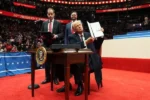Imagine a brave prosecutor standing up for what she believes is right, even when faced with pressure from powerful leaders. This story begins with Danielle Sassoon, the top federal prosecutor in Manhattan, who decided to resign after refusing to drop a serious criminal case against New York City Mayor Eric Adams. Her decision sparked a wave of resignations among other Justice Department officials, showing just how important it is to protect the law. Join us as we explore this dramatic situation, the reasons behind her resignation, and what it means for justice in America.
| Category | Details |
|---|---|
| Incident | Resignation of Danielle Sassoon, top federal prosecutor in Manhattan, in protest against the Trump administration’s directive. |
| Reason for Resignation | Refusal to drop federal criminal case against New York City Mayor Eric Adams. |
| Key Figures | Danielle Sassoon (former U.S. Attorney), Pam Bondi (Attorney General), Emil Bove (acting Deputy Attorney General), Eric Adams (Mayor of NYC). |
| Concerns Raised | Sassoon highlighted that Bove’s directive raised concerns about prosecutorial integrity and the rule of law. |
| Charges Against Adams | Indicted on charges of bribery, wire fraud, solicitation of contributions from a foreign national, and conspiracy. |
| Potential Additional Charges | Prosecutors considered adding obstruction of justice charges due to evidence of destroyed evidence and misleading the FBI. |
| Quid Pro Quo Allegation | Defense attorney Alex Spiro allegedly suggested that Adams would assist with enforcement priorities only if the indictment was dismissed. |
| Response from Defense | Spiro denied the allegations, claiming that there was no proof of wrongdoing by Adams. |
| Criticism of Sassoon | Bove criticized Sassoon for her insubordination and refusal to comply with duties. |
The Resignation that Shook the Justice Department
On a surprising Thursday, Danielle Sassoon, the top federal prosecutor in Manhattan, decided to resign. Her resignation was a powerful statement against the Trump administration’s directive to drop serious criminal charges against New York City Mayor Eric Adams. Sassoon’s decision wasn’t just about her job; it was about standing up for what she believed was right. In her resignation letter, she expressed her concerns about the integrity of the legal system and the importance of following the law without fear or pressure.
Sassoon’s resignation sparked a series of other top officials leaving the Justice Department, highlighting a growing tension within the government. These resignations show that many prosecutors value their independence and their duty to the law over political pressure. Sassoon’s actions remind us that justice should be upheld fairly for everyone, regardless of their position. Her stand not only affected her career but also sent a strong message about the importance of integrity in the justice system.
Understanding the Legal Issues Behind the Resignation
In her resignation letter, Sassoon raised serious concerns about the order she received from acting Deputy Attorney General Emil Bove. Bove had suggested that the charges against Mayor Adams could be dropped in exchange for his cooperation on other political matters, specifically regarding illegal immigration. Sassoon felt that this kind of deal was unfair and undermined the rule of law. She believed that dismissing the indictment without clear legal reasons could harm the integrity of the judicial process.
Sassoon’s letter emphasized that following the law should come first, and any actions taken should be based on the strength of the case, not political favors. She pointed out that the Justice Department’s guidelines prohibit coercive behavior and other forms of misconduct. By refusing to comply with the directive, Sassoon stood up for the values of justice and fairness, making it clear that no one, not even a mayor, should be above the law.
The Impact of Political Pressure on Justice
The situation surrounding Danielle Sassoon’s resignation highlights the potential dangers of political pressure on the justice system. When prosecutors are asked to dismiss charges for political reasons, it can lead to a loss of public trust in the legal system. Sassoon’s experience serves as a reminder that the rule of law must be upheld without interference from politics. Ensuring justice is served fairly is crucial for maintaining faith in the legal system.
Furthermore, the allegations against Mayor Adams regarding bribery and conspiracy underscore how serious legal issues can become tangled in political agendas. Sassoon’s commitment to pursuing justice, despite the pressures from higher authorities, showcases the importance of having dedicated officials who prioritize the law over personal or political gain. The integrity of the justice system depends on individuals like Sassoon who are willing to stand up for what is right, even when faced with difficult choices.
The Impact of Political Influence on Justice Department Integrity
The recent resignation of Danielle Sassoon highlights the troubling intersection of politics and the legal system. When federal prosecutors are pressured to dismiss charges for political favor, it undermines the rule of law. Sassoon’s refusal to comply with a directive she deemed unethical serves as a stark reminder of the importance of maintaining judicial independence, especially within the Justice Department. Such incidents can erode public trust in government institutions that are meant to uphold justice impartially.
Moreover, this situation raises critical questions about the ethical responsibilities of federal officials. Sassoon’s letter emphasized that complying with orders that compromise the integrity of the legal process not only affects individual cases but also sets a dangerous precedent for future administrations. If political agendas dictate legal outcomes, the very foundation of democracy is at stake, as citizens may lose faith in a system that should be fair and just.
Repercussions of the Resignation on Future Prosecutorial Conduct
Sassoon’s resignation is likely to have far-reaching repercussions for how federal prosecutors approach their duties moving forward. By prioritizing ethical considerations over political pressures, she sets a powerful example for her colleagues in the Justice Department. This incident could encourage other prosecutors to stand firm against directives that compromise their professional integrity, fostering an environment where legal principles are protected against political machinations.
Additionally, Sassoon’s actions may inspire a broader movement within legal circles advocating for transparency and accountability in prosecutorial decisions. As more officials witness the fallout from this situation, they may feel empowered to resist similar pressures. Ultimately, such a shift could rejuvenate the commitment to justice that defines the legal profession, ensuring that the law remains a shield against political influence rather than a tool for it.
The Role of Ethics in Prosecutorial Decision-Making
Ethics play a crucial role in prosecutorial decision-making, as highlighted by Sassoon’s stance against the directive from the Trump administration. Prosecutors are entrusted with the responsibility of pursuing justice, which requires them to evaluate cases based on evidence and legal merit, not political motivations. Sassoon’s emphasis on her duty to uphold the law reflects a broader ethical commitment that should guide all prosecutorial actions.
Furthermore, the ethical dilemmas faced by prosecutors can often be complex and multifaceted. Clear guidelines and a strong ethical framework are essential for navigating these challenges. Sassoon’s resignation serves as a call to action for the Justice Department to reinforce its commitment to ethical standards, ensuring that prosecutorial discretion is exercised with integrity, thereby protecting the integrity of the judicial system as a whole.
Public Trust and the Future of the Justice System
The fallout from Sassoon’s resignation underscores the critical relationship between public trust and the justice system. When citizens perceive that political influence can sway legal proceedings, confidence in the system diminishes. Sassoon’s refusal to dismiss charges against Mayor Adams for political gain is a crucial stand for maintaining public faith in legal institutions, which rely heavily on the belief that justice is administered fairly and without bias.
Looking ahead, it is essential for the Justice Department to actively work towards rebuilding this trust. Transparency in decision-making processes, along with a commitment to ethical conduct, can help reinforce public confidence. By addressing these issues head-on, the department can reassure citizens that their legal system is not merely subject to the whims of political leaders but remains a steadfast protector of justice and accountability.
Frequently Asked Questions
What did Danielle Sassoon do that was important?
Danielle Sassoon **resigned** as a top prosecutor because she didn’t want to drop a case against New York Mayor Eric Adams. She felt it was her duty to follow the law and **protect justice**.
Why did Sassoon refuse to follow the order from Bove?
Sassoon refused because Bove’s order was to dismiss charges without a good reason. She believed it was important to act fairly and uphold the **rule of law**.
What were the charges against Mayor Eric Adams?
Mayor Eric Adams faced serious charges including **bribery**, **wire fraud**, and conspiracy related to illegal donations to his campaign. These accusations are part of a **criminal investigation**.
What is a grand jury and why is it important?
A **grand jury** is a group of people who decide if there is enough evidence to charge someone with a crime. It’s important because it helps ensure that people are not falsely accused without good reason.
What does ‘quid pro quo’ mean in this case?
‘Quid pro quo’ means ‘something for something.’ In this case, it suggests that Adams would help with immigration laws if the **charges against him** were dropped.
Why is it a big deal if prosecutors are told to drop charges?
If prosecutors are told to drop charges, it can mean that **justice is not served**. It raises concerns about fairness and the **integrity** of the legal system.
What does it mean to uphold the rule of law?
To **uphold the rule of law** means to follow laws fairly and treat everyone equally. It ensures that everyone is held accountable for their actions, including those in power.
Summary
The content details the resignation of Manhattan’s top federal prosecutor, Danielle Sassoon, in protest against a directive from the Trump administration to dismiss charges against New York City Mayor Eric Adams. Sassoon’s resignation followed her refusal to comply with acting Deputy Attorney General Emil Bove’s order, which she deemed inconsistent with her duty to uphold the law. She expressed concerns over potential coercion related to Adams’ indictment for bribery and other charges, suggesting a quid pro quo for his assistance in immigration enforcement. Sassoon’s resignation highlights tensions within the Justice Department regarding legal integrity and political influence.







